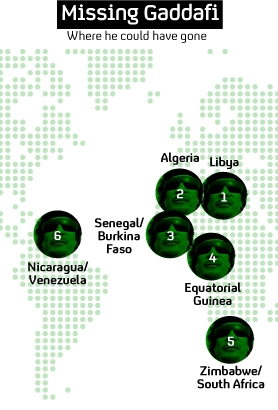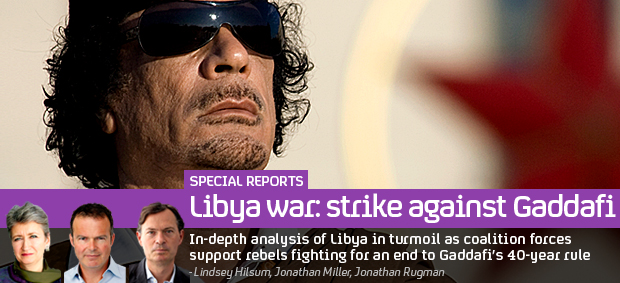Defiant Gaddafi rallies supporters as rebels target hometown
 Lindsey Hilsum
International Editor
Lindsey Hilsum
International Editor
Colonel Gaddafi calls on his supporters to march on Tripoli and “purify” the capital of Libya’s rebels, as International Editor Lindsey Hilsum meets neighbourhood groups patrolling the streets.
Muammar Gaddafi has denounced the rebel forces trying to capture him as “rats, crusaders and unbelievers”.
In a short audio speech broadcast on loyalist TV channels, Gaddafi called on all Libya‘s tribes to rally and expel what he called foreign agents from the country.
Earlier a group of rebels fired at several apartments in Tripoli where they suspected Gaddafi was hiding. Opposition fighters believe Libya‘s leader of 42 years is holed up with some of his sons.
“They are together. They are in a small hole,” one of the fighters involved in the battle told Reuters.
“Today we finish. Today we will end that.”
Rebels are moving in on Sirte, Gaddafi’s hometown, from two sides and are hoping to negotiate the surrender of its defenders. But the rebels say Gaddafi’s hardcore loyalists in the town 450km (280 miles) east of Tripoli have vowed to fight to the death.
But some of Gaddafi’s opponents fear that he may rally an insurgency, as Saddam Hussein did in Iraq. A million dollar reward has been offered for his capture “dead or alive”.
Earlier Channel 4 News Chief Correspondent Alex Thomson blogged from Tripoli, describing the gunfire.
He said: “All the fighters themselves are armed with Kalashnikovs and there’s the occasional recoiled rifle and even one multi-rocket launch system.
“So they are forming up to travel up from here to the Abu Salim district known to the wider world as the place where the Rixos hotel is, where a number of journalists recently had an enforced stay at the hospitality of the Colonel’s guards.
“The morale of these young men cannot be higher.”
More from Channel 4 News: Rebels circle Abu Salim, Gaddafi loyalists' last stronghold
Where could Gaddafi be?
Algeria
Colonel Gaddafi was alleged to be “near the Algerian border” on Sunday while rebels flooded Green Square, now renamed Martyrs’ Square. The Algerian Foreign Ministry denied that he was in the country on Monday, but could he be there now?
Tunisia
As the rebels made the push into Tripoli over the weekend, US officials claimed that Gaddafi and his family were preparing to leave for Tunisia. But Tunisia might not want him, as he opposed their revolution in January. In any case, Tunisia joined the International Criminal Court this past June, so they would be compelled to turn him over to the Hague for trial. What’s more, Gaddafi going into exile so close to home would not go down well with the National Transitional Council in Libya.
Saudi Arabia
Has previously extended hospitality to ousted Pakistani Prime Minister Nawaz Sharuf, overthrown Tunisian president Zine al-Abidine Ben Ali and Ugandan tyrant Idi Amin. But Saudi-Libyan relations have shown signs of strain in recent years, with Gaddafi accused of plotting King Adullah’s assassination in 2004 and telling the Saudi monarch in 2009: “You were propelled by fibs towards the grave and you were made by Britain and protected by the US”.

Equatorial Guinea
Gaddafi has strong links with the African Union, making it a good possibility that he’ll stay on the continent, and Equatorial Guinea is a not a member of the International Criminal Court which indicted Gaddafi two months ago. That means he would be able to avoid prosecution. President Teodoro Obiang Nguema is the second-longest-serving African leader after Colonel Gaddafi but it is questionable as to whether he will offer Gadaffi refuge.
Senegal
Gaddafi’s got some friends here, and in 2005 Libya provided the funds for the £154m “Gaddafi Tower” in Dakar, however the project’s been put on hold for now. Senegal was strongly in favour of Gaddafi’s call for a United States of Africa.
Burkina Faso
President Blaise Compaoré is a good friend and protégé of Colonel Gaddafi. Eleven years ago Libya co-financed Ouga 2000, a futuristic satellite city on the outskirts of the Burkinabé capital Ouagadougou.
Get the latest from the Channel 4 News Libya live blog
Zimbabwe
During a visit to Burkina Faso in 2010, Gaddafi stated that he thinks Robert Mugabe is a very good leader and shouldn’t leave until office he has solved every problem in Zimbabwe. The Zimbabwean president clearly holds his Libyan counterpart in a similar regard, as repeatedly condemned the Nato Alliance’s offensive in Libya, and reportedly sent several hundred soldiers to help stem the protests when they broke out in February. Zimbabwe is also home to several other hostile African leaders, such as former Ethiopian president Mengistu Mariam. However Mugabe’s getting on in age, and the inevitable rapid changes that will take place in Zimbabwe when he dies mean long-term protection won’t be guaranteed for Gaddafi.
South Africa
Iconic former president Nelson Mandela is an unlikely friend to Gaddafi, grateful for his support for the African National Congress in the struggle against apartheid. As for the current president Jacob Zuma, he’s visited Libya to call for a cease-fire agreement. The country has already taken in ousted former Haitian president Jean-Bertrand Aristide and Madagascar’s Marc Ravalomanana. However there is likely to be an outcry in relatively liberal South Africa if Gaddafi were to be granted exile there, and foreign minister Maite Nkoana-Mashabane has suggested South Africa would not offer Gaddafi asylum.
Venezuela
Gaddafi was seen shopping on a Venezuelan island a couple of years ago. President Hugo Chávez has visited Libya several times and has football stadium there named in his honour. Chávez has compared Gaddafi to Simon Bolívar (who liberated South America from Spanish rule). Earlier this week the Venezuelan leader said that he refuses to recognise the new Libyan government, and to him Gaddafi’s government is the only real one. However the spanner in the works could be Chávez’s own floundering grip on power.
Nicaragua
President Daniel Ortega is a long-standing ally to Gaddafi, based on their shared distrust of the US. When the unrest broke out in February, Ortega said he had phoned the Libyan leader several times because he “is again waging a great battle” to defend the unity of his nation.
Libya
Support for Gaddafi remains strong in his hometown, making it a possible refuge – apart from the fact it is being targeted by rebels today.
The Rixos Hotel, where several journalists were trapped on Wenesday, could be a surprise hiding place. Gaddafi appeared to give a speech from there in May, surprising journalists staying there who claimed they never saw him arrive or leave. Staff at the Rixos have claimed that he may have an elaborate tunnel system connected to the hotel. Other possible hideouts could be a hospital outside of Tajoura, a Tripoli suburb. Hospitals would be one of the safest places from attack.
